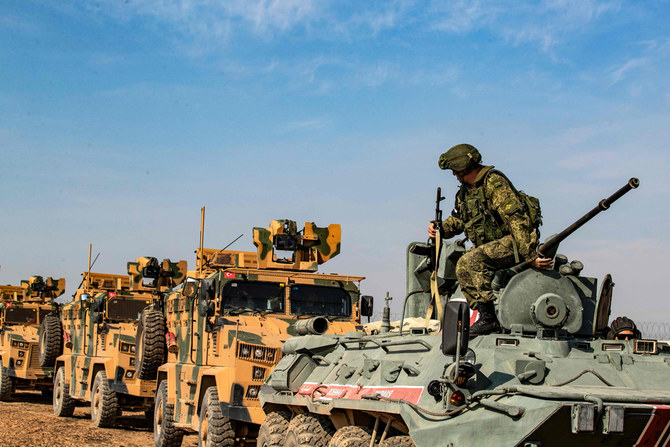
- ARAB NEWS
- 02 Jul 2025

Ankara has itself in a quandary as it is now in geopolitical debt to Russia. When US President Donald Trump ceded to Turkish President Recep Tayyip Erdogan, allowing Ankara to enter northeastern Syria, Moscow jumped for joy. Now joint Russian-Turkish patrols are deploying in Syria after the initial withdrawal of US forces. For Russia, the moment has arrived for an alternative form of maximum pressure.
Russia’s position is now dominant over Turkey. With Turkey entering northeastern Syria to take on the Kurdish Syrian Democratic Forces, killing hundreds and displacing tens of thousands, the area’s chessboard changed. In addition, Daesh leader Abu Bakr Al-Baghdadi was killed in a Turkish-controlled Free Syrian Army area a few miles from the Turkish border.
According to the Dutch General Intelligence and Security Service, Daesh has used Turkey as “a strategic base” to reorganize, threatening European security. Turkey’s primary focus is fighting Kurdish groups and not Daesh, which allows the latter breathing space and freedom of movement into Turkey and beyond. Turkish interests do not match European priorities in fighting terrorism and it is a major inhibitor to stopping Daesh adherents spreading themselves to other regions once again.
Russia knows about Turkey’s complicity in helping Daesh. Erdogan’s immediate family is accused of being involved in assisting elements of the Daesh economy and its supply lines. Criminal networks that were smuggling oil into Turkey have also been supplying weapons, equipment and training to Daesh and other Islamist groups since 2015. Russia’s evidence is more powerful when presented to Ankara because of the atmosphere between the two leaders. Vladimir Putin’s four years of support will now be used by Moscow to extract more geopolitical concessions from Ankara.
With the above in mind, Turkey is under pressure. Turkey purchased and took delivery of the Russian-made S-400 missile defense system, which caused outrage in Washington. Meanwhile, the first part of a new Russia-Turkey natural gas pipeline is complete and Russia plans to build four nuclear power plants in Turkey as part of an expanding set of ties, in which Ankara is spending billions of dollars with Moscow in return for the enhancement of their bilateral relationship.
But there is more to the debtor-creditor relationship. Russia is now adding further weapon sales to Turkey’s bill regarding Syria; S-400s are already on the menu and Turkey is about to order four more batteries. These batteries change the entire scope of Turkey’s reason for purchasing the S-400 in the first place. The motivation at the time was to procure a system to show independence from the West and specifically from the White House.
Putin’s four years of support will now be used by Moscow to extract more geopolitical concessions from
Ankara.
Thinking about how Turkey will likely deploy its further S-400 regiments in different parts of the country is important because they will be freestanding and not mutually support each other. They will be useful as a deterrent from within the country, but the real point is the coverage the S-400 gives Turkey over the Black Sea and Mediterranean, where tensions can rise quickly, possibly pitting NATO members against one another. In addition, Russia is seeking to sell advanced missiles and Sukhoi Su-57 and Su-35 fighter jets. This relationship is Russia’s dream come true and raises the question about Turkey being a NATO member.
For Syria, the Russian-Turkish relationship means that Bashar Assad will be listening to what Moscow says next, and when. Putin has both countries under his thumb. The challenge, of course, is related to ongoing military operations by all sides aimed at shifting Syria into its next stage of negotiations. That track is moving along and Moscow’s attention to the detail of the Syrian constitutional process will be vital to what occurs.
Assad’s ability to complete its ongoing tasks is supported by Russia, which puts Ankara in a bit of a squeeze because, for Syria, although the invasion raises clear issues with regard to sovereignty, the Turkish move also helped Assad to consolidate greater control over the country and to move toward further negotiations on Syria’s future. Moreover, the start of a new round of Geneva discussions based on key proposals from Moscow is beginning under the supervision of UN special envoy for Syria Geir Pedersen. Clearly, Russia is underscoring once again its role in the political future of Syria.
The surprising thorn in Moscow’s plan is the US pivot of forces to protect oilfields in eastern Syria. Some US troops are to remain in Al-Tanf, close to the Iraqi border, and more are being sent to the oilfields around Deir Ezzor. This move by the US flusters Damascus and Moscow, as well as Iran, because of the longer-term view about where pipelines might transverse the Levant in a stable future. The Pentagon has made a smart move that surprised both Russia and Turkey, and thereby created a wedge that will make Syria more challenging for Russia in the near future, in terms of Assad’s requirements to bring the country back together.
Overall, Russia is in a superior position, but the US just threw a spanner into the geopolitical works. Not mentioned is Iran, whose say in such matters is increasingly weakening. Turkey remains subservient to Moscow but also faces Washington’s wrath. Does Turkey belong in Europe given the above?